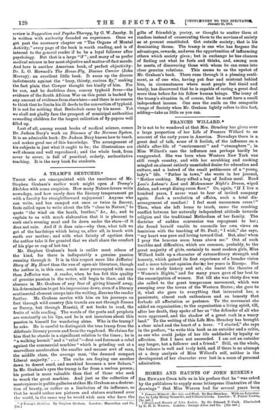FRANCES WILLARD. *
IT is not to be wondered at that Mrs. Strachey has given over a large proportion of her Life of Frances Willard to an account of the early years in America. Nowadays there is a. great deal of talk, some of it foolish, of the influence on a child's after-life of "environment" and " atmosphere " ; in Miss Willard's case the influence can perhaps hardly be exaggerated. She was born when Western New York was still rough country, and with her scrubbing and cooking mingled an almost entirely unsatisfied desire for education and culture, and a hatred of the small pettinesses of a "young lady's" life. "Father in town," she wrote in her journal, "Mother cooking. Mary sifted a bag of Indian meal. Read Love's Labour's Lost and Midsummer Night's Dream, wiped dishes, and swept dining-room floor." Or, again, "If I live a hundred years, I never want to hear of invited company again. Such a revolution of affairs, such a total dis- arrangement of comfort ! I feel most uncommon cross ! " Then, when she left home to teach, came the crashing conflict between her naturally independent attitude towards religion and the traditional Methodism of her family. The doctrine of sudden conversion was repugnant to her; she found herself unable to reconcile her own views on feminism with the teaching of St. Paul; " I wish," she says, " my heart was pure and loving toward God. But, alas! when I pray the heavens seem brass above me." Out of such troubles and difficulties, which are common, probably, to the great majority of girls, certainly to most modern girls, Miss Willard built up a character of extraordinary strength and honesty, which gained its first experience of a broader vision and a more tolerant opinion durin-4 her years in Europe. She came to study history and art; she learnt the theories of " Women's Rights," and for many years gave of her best to the emancipation of women. Not till she was thirty-five was she called to the great temperance movement, which was sweeping over the towns of the Western States ; she gave to it, what she gave to everything that interested her, a passionate, almost rash enthusiasm and an honesty that forbade all affectation or pretence. To the movement she added an organization ; to the organization a living spirit, till, after her death, they spoke of her as " the defender of all who were oppressed, and the shadow of a great rock in a weary land." To the writing of this Life Mrs. Strachey has brought a clear mind and the heart of a lover. "I started," she says in the preface, "to write this book as an outsider and a critic, as one who could judge of her life unblinded by loyalty or affection. But I have not succeeded. I am not an outsider any longer, but a follower and a friend." Still, on the whole, the balance is well and truly held, and if there is no attempt at a deep analysis of Miss Willard's self, neither is the development of her character ever lost in a maze of personal admiration.


























































 Previous page
Previous page